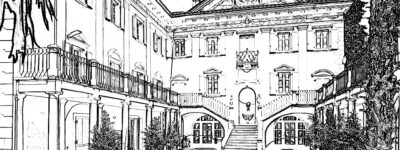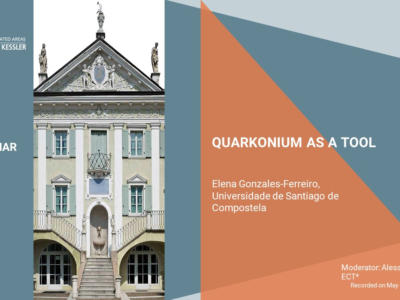Quarkonium as a tool
Webinar

Online Event - ECT*
Strada delle Tabarelle, 286
Trento - Italy
Quarkonium has been regarded as one of the golden probes to identify the phase transition from confined hadronic matter to the deconfined quark-gluon plasma (QGP) in heavy-ion collisions. I will review recent developments in the study of the J/ψ and ϒ families at the energies of Large Hadron Collider. In particular, the possible implications related to the production and propagation of quarkonia in proton-proton and proton-nucleus collisions will be discussed, with a special emphasis on the excited states such as the ψ′, Υ(2S) and Υ(3S).
Moreover, in the last years, there has been a remarkable progress in the heavy meson spectroscopy. Plenty of exotic states, not well described in the conventional constituent quark model have been discovered. Recently LHCb collaboration has presented the relative production rates of promptly produced X(3872) over ψ′ as a function of particle multiplicity.
I will show that models incorporating final state effects, such as breakup via interactions with comoving hadrons, are able to describe the relative suppression of excited-over-ground quarkonium states in pA collisions. In the case of proton-proton collisions, these final state effects can affect the quakonia production for multiplicities higher than the mean value, giving rise to a suppression that evolves with the increase of comoving particles. These models can help to determine the structure of the X(3872).
I will present our results for the ratio of X(3872) over ψ(2S) compared to LHCb data from proton-proton collisions. They are consistent with the interpretation of the X(3872) as being a tetraquark with a size between 1 to 2 fm and a biding energy of the order or smaller than the one of the ψ(2S). They disfavour the interpretation of the X(3872) as weakly bound hadronic molecule of large size.
Moderator: Alessandro Pilloni
People
-
Elena Gonzales-Ferreiro is professor at the Faculty of Physics of the University of Santiago de Compostela in Spain. Her research work is mostly devoted to particle physics phenomenology, in particular the search of the quark-gluon plasma and the different interpretations of quarkonium production. She actively collaborates with the Ecole Polytechnique and Institut de Physique Nucléaire de Orsay, as invited professor since 2006.
